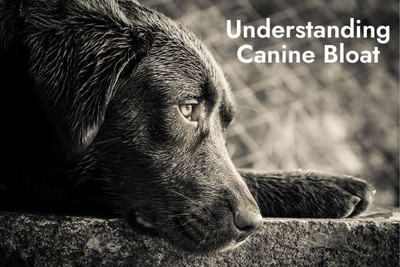Posted by K9 Active on Aug 05, 2023
Canine bloat, also known as gastric torsion, is a life-threatening condition that all dog owners should be aware of, especially if you have a deep-chested breed. In our own experience with our beloved Weimaraner, Chez, we witnessed the condition firsthand as he got older. This article will help you recognize the signs of bloat, learn about treatment options, and understand how to prevent this dangerous condition in your dog.

What Causes Canine Bloat?
Bloat occurs when the stomach becomes distended due to trapped air or gas, causing it to swell and potentially twist within the body. This can lead to a fatal condition called twisted gut. Deep-chested dogs like the Great Dane, Bloodhound, and German Shepherd are at a higher risk of developing bloat. Vigorous exercise right before or after a meal or eating a large amount of food followed by heavy drinking can trigger this condition.
Symptoms of Canine Bloat
The initial symptoms of bloat can be subtle and easy to miss, so it's essential to know what to look for:
- Swelling in the stomach or chest area: A small lump that can fit into the palm of your hand may be the first sign of bloat.
- Tight stomach: The stomach may feel tight and make a hollow sound when patted.
- Lethargy and discomfort: The dog may appear lethargic, uncomfortable, and may pace or pant.
- Extreme swelling: In severe cases, the dog can blow up like a balloon, which is extremely dangerous and potentially fatal.
- Signs of shock: As the condition progresses, the dog may show symptoms of shock, including pale gums and tongue, shallow breathing, collapse, and eventually, death.
Treatment for Canine Bloat
Immediate veterinary treatment is crucial for a dog experiencing bloat. Depending on the severity of the condition, the veterinarian may pass a tube down the throat into the stomach to relieve the tension or perform surgery if the stomach has twisted within the body.
Preventing Canine Bloat
As a dog owner, you can take several measures to reduce the risk of bloat in your pet:
- Split your dog's daily food into smaller portions to prevent gulping.
- Avoid intensive exercise directly around mealtimes and allow a rest period between walks and eating.
- Be mindful of your dog's drinking habits and avoid large amounts of water at any time.
- Many dry dog foods swell when digested, so be cautious about drinking around mealtime. Pre-soaking the dry food can help you gauge a reasonable amount to feed at each meal.
If your dog has suffered from gastric torsion, they are at risk of recurrence, so it's crucial to remain vigilant and take the necessary precautions.
While bloat may sound alarming, it's important to remember that it isn't an everyday occurrence. However, following the prevention techniques as a matter of habit and being aware of the potential risk can help keep your dog safe and healthy.
In Conclusion
Canine bloat is a serious and potentially fatal condition that can affect any dog, but especially those with deep chests. By recognizing the symptoms, seeking immediate veterinary treatment, and following preventative measures, you can protect your dog's health and ensure they live a long and happy life. Stay aware, follow the prevention techniques, and you and your furry friend can continue to enjoy many years of companionship.
